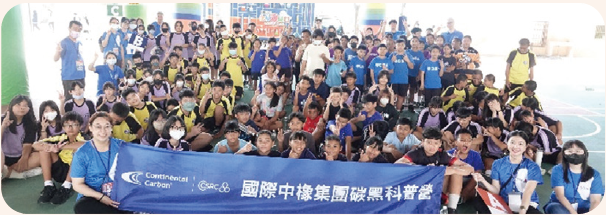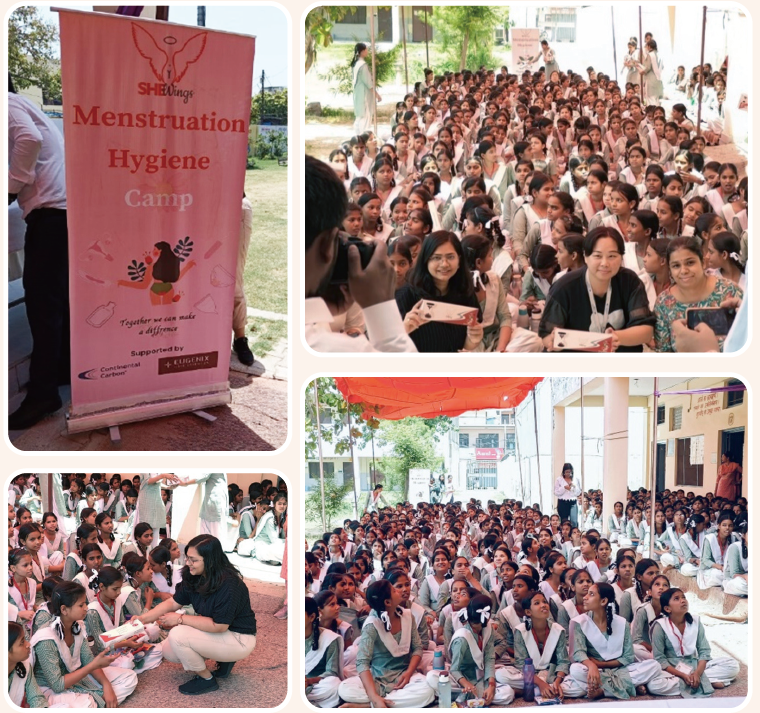CSRC values recycling and rebirth, guided by the vision of “Eco-friendly civilization” and the mission of “Renewable energy and resources”. In addition to actively enhancing the benefits of a circular economy, we also focus on social feedback, ecological preservation, and issues related to cultural promotion. Through investments in these three areas, we aim to promote social welfare. The amount invested in 2024 totaled NT$3.62 million.
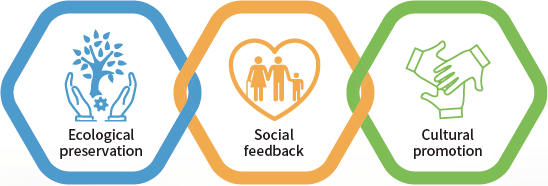
CSRC adheres to corporate social responsibility, implements policies and commitments for social welfare through actions categorized as "Community Care" and "Education Care," actively promoting social well-being.
CSRC adopts an attitude of social responsibility in respect to neighboring communities, and regards the neighboring communities around production plants as family members who are closely related in life. Both environmental protection control and production process safety are top priority basic operating policies. As the Company operates, we maintain ongoing interactions with nearby neighbors through various means to understand the needs of the local community. Each year, we engage in communication and negotiations with local communities regarding development plans at our operational sites. We also comply with regulatory requirements by actively developing management strategies for handling wastewater, emissions such as gases, and waste disposal. Regular training sessions are conducted on emergency response plans and fire safety, ensuring that employees are familiar with rescue and evacuation procedures and enhancing their safety awareness. In addition, CSRC and the government simultaneously carry out carbon emission index monitoring and make energy conservation and emission reduction plans to achieve short, medium and long-term carbon reduction goals.
CSRC's operations may affect air quality in neighboring communities. To mitigate the risk of air pollution, each manufacturing site strictly manages environmental protection in accordance with government requirements and develops various internal management plans. For the Linyuan Advanced Plant in Greater China, all process stages are equipped with relevant pollution monitoring equipment. Furthermore, equipment maintenance is carried out on a regular basis every year, and relevant air pollution factor data are also reported annually in accordance with regulations. The other plant areas also have relevant measures and actions for air pollution management. Please refer to 4.3 Air Pollution Control for details. In 2024, it was evaluated that CSRC's operating activities had no significant negative impact on local communities and the environment.
Moreover, the company actively engages with communities to improve local employment conditions. Creating local job opportunities is a key action to strengthen ties with communities. At the Linyuan Advanced Plant and Chongqing Plant in Greater China, local employees constitute 69% and 74% of the workforce, respectively. Meanwhile, the Maanshan and Anshan Plants in the Greater China boast a 100% local employee recruitment rate. This clearly illustrates CSRC's dedication to retaining local talent and promoting regional economic development.
Furthermore, CSRC supports community development activities and various charitable and emergency relief efforts, deepening neighborly relations and reinforcing community awareness of issues such as education, health, and public hygiene.
The Linyuan Advanced Plant has donated a batch of firefighting equipment, including firefighting boots, protective helmets, portable tool lights, and other rescue equipment to the Kaohsiung City Fire Department to bolster firefighting and disaster response capabilities.
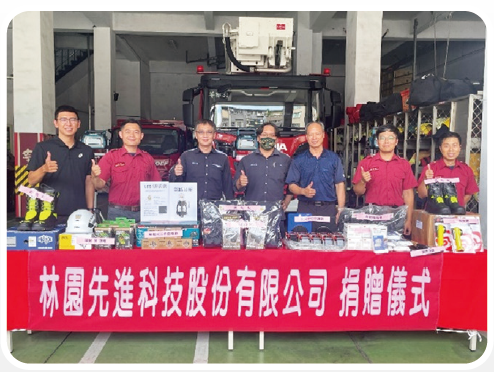
- The Sunray Plant sponsored community events and youth baseball league activities in the Sunray community.
- The Ponca Plant supported community organizations in Ponca to host resident activities.
- The CCIPL Plant installed rooftop solar panels in a police residential area to increase the use of renewable energy.
- The CCIPL Plant restored three public ponds in Asalatpur village, Ghaziabad, to facilitate rainwater collection and reuse by local residents.
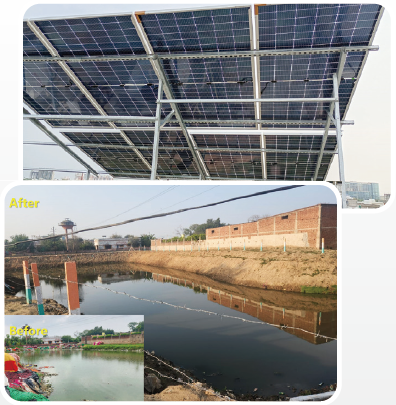
- Communicate and discuss with neighbors and continue to interact to understand the safety needs of neighboring communities.
- Establishing an emergency response plan to ensure immediate reporting and handling procedures during emergencies.
- Conducting fire safety drills to ensure that employees are familiar with rescue and evacuation procedures.
- Strictly manage environmental protection work in accordance with government requirements, formulate various internal management plans, and improve employee safety awareness.
- Employing local staff to create local job opportunities and enhance employee understanding of Company culture and philosophy.
- Strengthening community education, health, and public hygiene awareness through material donations or employee participation.
- Providing timely manpower and material assistance in the event of natural disasters to expedite neighborhood recovery efforts.
【Cement Academy】
Through the " Cement Academy," a joint initiative with the Taiwan Cement Group, CSRC has long supported schools near its manufacturing plants. The initiative is dedicated to fostering the development of schoolchildren, promoting diverse perspectives, and enhancing their willingness to learn. We support educational activities in community schools and provide academic tutoring for children in remote areas. In 2024, the Linyuan Advanced Plant in Greater China funded after-school tutoring programs at Jhongyun Junior High School, as well as conversational English classes and resin clay art classes at Shanwei Elementary School, offering diverse learning resources to local students. Additionally, CSRC established the Cement Academy Scholarship to encourage academic excellence and alleviate financial burdens for disadvantaged families, inspiring students to contribute to society in the future.
In 2024, the total funding for tutoring programs and scholarships amounts to 192,000 NTD, benefiting 144 students.
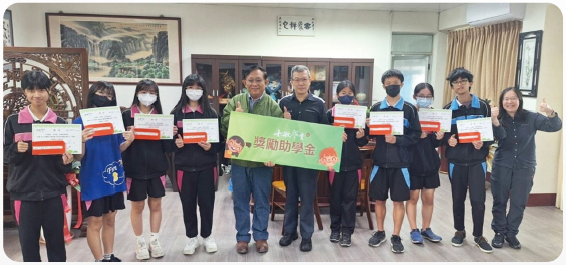

CSRC is dedicated to promoting a circular economy and upholding social care and education. By embedding the principles of environmental sustainability and circular economy into education, CSRC has partnered with the Tamkang University Center for Science Education since 2021 to launch a collaborative project. This initiative combines circular economy knowledge with educational activities, designing hands-on carbon black science experiments for parents and children. The project includes the "Fun Chemistry with Carbon Black Science Camp," which utilizes a mobile chemistry lab to visit elementary and junior high schools, as well as other large-scale science education events. The goal is to enhance students' interest in chemistry through interactive learning and to promote the principles of environmental sustainability and circular economy.
- Promote circular economy education through engaging hands-on carbon black experiments, guiding children to understand the importance of sustainability and circular economy.
- Spark students' interest in chemistry through fun science experiments led by volunteers with professional chemistry backgrounds, shaping their perception of scientists.
- Enhance students' understanding of chemical applications by integrating carbon black materials into experiment designs through industry-academia collaboration.
- Foster a win-win model for chemistry education by connecting chemistry education with industrial applications through campus tours and teacher workshops.
- Provide diverse learning opportunities for rural students by focusing on schools with limited educational resources through outreach activities.
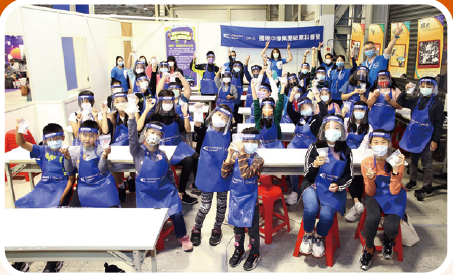
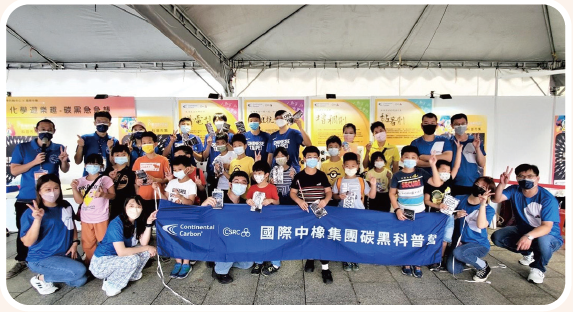
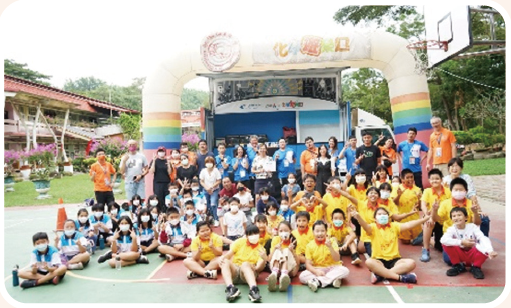
In 2024, a new "Dark Art" experiment utilizing carbon black’s dyeing properties was introduced. The mobile chemistry camp visited 33 schools, engaging 1,500 students in hands-on experiments. A workshop was held for rural elementary schools in Fangliao, Pingtung, providing transportation and experiment opportunities for students.
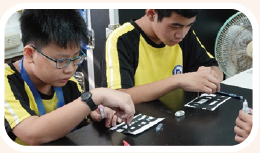
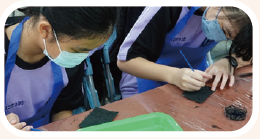
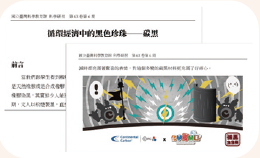
To further science education, two articles on carbon black materials and experiment designs—"Black Pearls in the Circular Economy: Carbon Black" and "Chemistry Fun: Carbon Black Buzzer"—were published in the National Taiwan Science Education Center’s journal (Issue 63-06), contributing to the promotion of carbon black applications and chemistry education.
